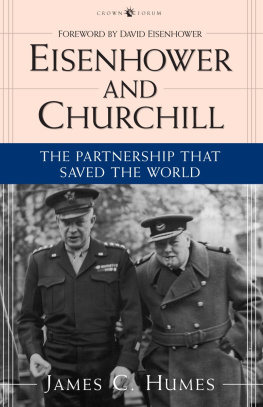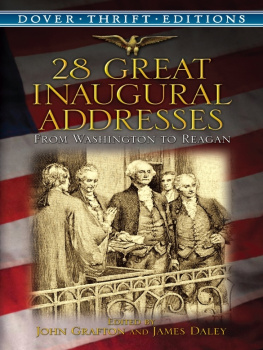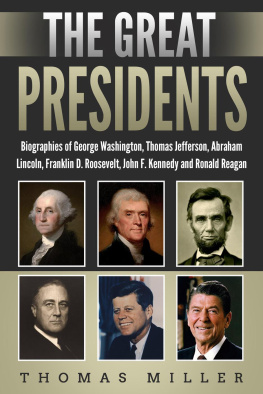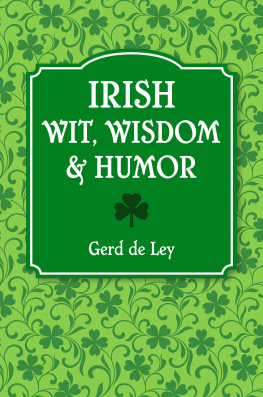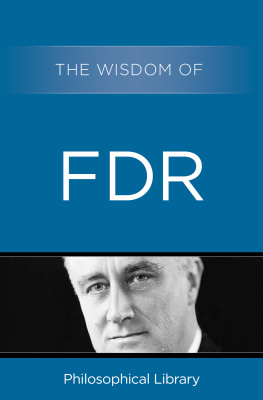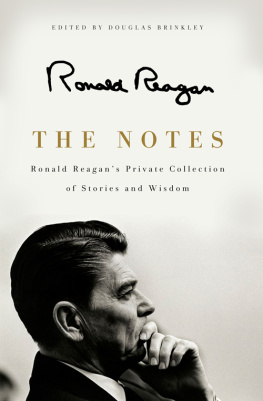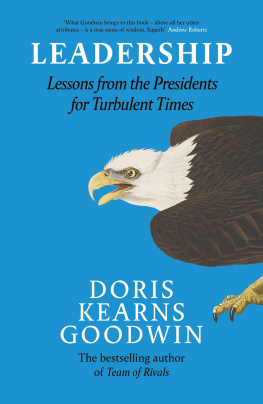W HAT IS A REGISTERED Republican doing writing this affectionate work about FDR? In fact, I am more than a nominal Republican. I was a White House speechwriter for several Republican presidents.
But the first president I ever remember is Franklin Delano Roosevelt and the first presidential election that I recall was the Roosevelt-Willkie race in 1940. Indeed, the first tie I ever wore was a navy-blue one with the name Wendell Willkie printed in small letters many times sloping down from left to right.
My father was a judge and local Republican leader who was often mentioned as a gubernatorial prospect until he died at the age of forty-two in 1943. Both my parents were eastern internationalist Republicans who daily read the New York Herald Tribune and weekly perused Henry Luces Time magazine.
Our city, Williamsport in upstate Pennsylvania, was Republican. On our block, there lived only one Democrat, an Episcopalian clergyman. My father, who served on the National Board of Foreign Missions of the Presbyterian Church (along with John Foster Dulles), argued both theology and politics with our neighbor across the street. As a judge, father particularly bridled at Roosevelts attempted packing of the Supreme Court (Supreme Court Justice Owen Roberts of Philadelphia was a friend). He was also incensed by FDRs breaking George Washingtons precedent to run for a third term. But the judge and clergyman maintained their good humor. The rector once pinned a Republican button on my mothers back that said, We dont want Eleanor either, which was my mothers name, as well as that of the first lady.
My parents, unlike the Midwest Taft Republicans of the day, supported Roosevelt on the need for the draft and the delivery of war shipments to Britain. Churchill was a hero in our house. My first long trousers were an exact copy of an RAF uniform with wings, which my mother had won for her leadership in the Bundles for Britain World War II relief organization.
My mother took Willkies defeat harder than my father. She was so sure that he would win that when he lost, she took to her bed for two days.
The first time I remember hearing President Roosevelt was his Day of Infamy speech, the day after the bombing of Pearl Harbor. My father and mother had all three of us boys listen to his talk on the Philco radio in the living room. The next day my father tried to enlist, but he was rejected because of his judicial office.
The following spring my Republican father wrote to a Harvard Law School classmate, who was a personal friend of the president, and asked him for a letter of introduction to FDR. In February of that year, a restored Williamsburg in Virginia had opened to the public. We soon combined a trip to Williamsburg at cherry blossom time with a visit to the nations capital.
Our new sky-blue Lincoln Zephyr stopped at Pennsylvania Avenue in front of the White House, where my father, armed with a letter from his friend as an introduction, walked in without an appointment to see if he could meet President Roosevelt.
My mother did not approve of what she called fraternizing with the enemy. She smoldered for two hours, as my two older brothers roughhoused and scrapped in the backseat. Then my father appeared, looking sheepishly toward my irate mother. Eleanor, I knew I shouldnt have talked to him. The S.O.B. charmed me.
Two years later was another election year. The first convention I remember listening to was the Democratic Convention and the fight that dumped Vice President Henry Wallace for a man named Truman.
In that election year of 1944, my now-widowed mother wore her Dewey-Bricker badge for the last two weeks of the campaign. But in her comments to her sons, she was less than confident of a Republican victory.
Actually, the manager of the Dewey campaign told me years later that their internal polls just after Labor Day had them only four points behind. My son-in-law, Cecil Quillen, was hosting a dinner in 1997 for the ninety-two-year-old Herbert Brownell (attorney general under Eisenhower) at the Brook, a private New York club. The other special guest of honor was my daughters St. Pauls School former classmate Thomas E. Dewey III. Young Dewey and Brownell had never met before. Brownell told us that their best issue in 1944 was Roosevelts health, which could only be hinted at as old and tired leadership.
That fall I remember one campaign leaflet a Republican ward leader dropped off at our door. It featured Communist Party President Earl Browder together with Roosevelt. I showed it to my mother, who dismissed it, saying, I dont need such tripe to vote against Roosevelt.
My mother, though, was scathing in her comments on Roosevelts early November open motorcar ride through New York City on a wet and chilly day.
They put pancake makeup on that sick mans face and then propped him up for that campaign stunt. Less than half a year later, Roosevelt was dead. On our street, there were Republicans actually celebrating the death of that man in the White House.
I walked into our house and said elatedly, Roosevelts dead, and the people up the street are having a beer party.
My mother replied, James Calhoun Humes, I am deeply chagrined at your behavior, and if your father was alive, he might have spanked you! Chagrin was her word that signaled maternal anger at egregious behavior, and that word, coupled with her former schoolteacher glare, never failed to trigger tears.
She continued, Franklin Delano Roosevelt was our president. We may have disagreed with many of his policies, but we must pay our respect to the office and the man who holds it. Your father would have been ashamed of your unpatriotic act against America. He would have severely disciplined you.
In the six decades since, my respect for the office has grown and, along with it, my respect for the ordeal it takes to get to the White House and the pressures on those who hold that office.
I remember years later, during Watergate, being at a dinner party in New York City when Nixon was being harshly criticized by the mostly Republican members at the table.
Margaret Truman Daniel, President Trumans daughter, who was also at the dinner, was asked her comments. Everyone knows my politics, but after living in the White House while my father was being attacked, I made up my mind to refrain from comments regarding a president while in office. (Truman, by the way, is the only president to receive a lower Gallup approval rating than Nixon. Truman received it in February 1952.)
To me, presidents were a part of our history, and I fell in love with American history. In my teens, I clipped and collected quotations and anecdotes about presidents. As part of the pre-TV radio and records generation, I played 78 records of the thirties and forties. My favorites were recordings of Churchill and Roosevelt, and I soon could mimic them and recite some of their speeches by heart.
I would meet Prime Minister Churchill in London in May 1953, when I was an English-Speaking Union scholar at a British school. When I said I wanted to enter government, Churchill said, Young man, study history. In history lie all the secrets of statecraft.



